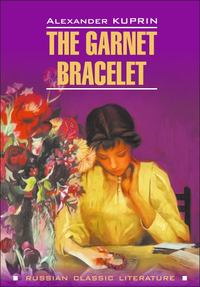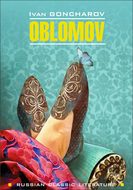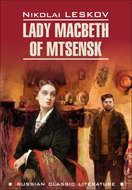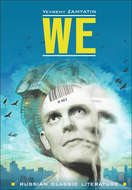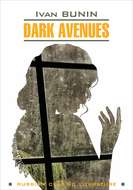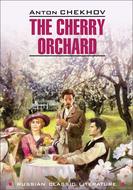Kitabı oku: «The Garnet Bracelet and other Stories / Гранатовый браслет и другие повести. Книга для чтения на английском языке», sayfa 2
IV
Fairway trotted along, snorting sonorously and tugging at the reins. The Shepetovka estate came into view ahead. Its white walls and red roof hardly showed through the thick green of lilacs and acacias. Below, a small pond stood out from its setting of green shores.
A woman was standing on the house steps. From afar Bobrov recognized Nina by the bright yellow blouse which set off her dusky complexion so beautifully, and at once, reining in the horse, he straightened up, and pulled back his feet, thrust deeply into the stirrups.
“Riding your treasure again, eh? I simply can’t bear the sight of that monster!” cried Nina in the gay and wayward tone of a spoilt child. She had long been in the habit of teasing him about his horse to whom he was so much attached. Someone was always being teased at Zinenko’s for something or other.
Bobrov threw the reins to the mill groom who had run up, patted the horse’s strong neck, dark with sweat, and followed Nina into the drawing-room. Anna Afanasyevna, who was sitting by the samovar all alone, affected great amazement at Bobrov’s arrival.
“Well, well! Andrei Ilyich!” she cried in a singsong. “Here you come at last!”
She pushed her hand against his lips as he greeted her, and asked him with her nasal twang, “Tea? Milk? Apples? What will you have?”
“Merci, Anna Afanasyevna.”
“Merci oui, ou merci non?”
French phrases like these were common in the Zinenko family. Bobrov would not have anything.
“Then go to the veranda,” Mme Zinenko permitted him graciously. “The young people are playing forfeits or something there.”
When he appeared on the veranda all the four young ladies exclaimed in unison, in exactly the same tone, and with the same twang, as their mother, “Well, well! Andrei Ilyich! Here’s someone we haven’t seen for ages! What will you have? Tea? Apples? Milk? Nothing? You don’t mean that! Perhaps you will have something, after all? Well, then sit down here and join in.”
They played “The Lady’s Sent a Hundred Rubles,” “Opinions,” and a game which lisping Kasya called “playing bowlth.” The guests were three students, who kept on sticking out their chests and striking dramatic attitudes, with one foot forward and one hand in the back pocket of their frock-coats; Miller, a technician distinguished by his good looks, stupidity, and wonderful baritone; and lastly a taciturn gentleman in grey, of whom nobody took any notice.
The game was not going well. The men performed their forfeits with a condescending, bored air, and the young ladies refused to perform theirs at all, whispering among themselves and laughing unnaturally.
Dusk was falling. A huge red moon floated up from behind the house-tops of the nearby village.
“Come inside, children!” Anna Afanasyevna shouted from the dining-room. “Ask Miller to sing for us.”
A moment later the young ladies’ voices rang through the rooms.
“We had a very good time,” they chirped round their mother. “We laughed so much!”
Nina and Bobrov remained on the veranda. She sat on the handrail, hugging a post with her left arm and nestling against it in an unconsciously graceful posture. Bobrov placed himself at her feet, on a low garden bench; as he looked up into her face he saw the delicate outlines of her throat and chin.
“Come on, tell me something interesting, Andrei Ilyich,” she commanded impatiently.
“I really don’t know what to tell you,” he replied. “It’s awfully hard to speak to order. So I’m wondering if there’s some collection of dialogues on various topics.”
“Fie! What a bo-ore you are,” she drawled. “Tell me, are you ever in good spirits?”
“And you tell me why you’re so afraid of silence. You feel uneasy the moment talk runs low. Is it so bad to talk silently?”
“ ‘Let’s be silent tonight,’ “ Nina sang, teasingly.
“Yes, let’s. Look: the sky is clear, the moon is red and big, and it’s so quiet out here. What else do we need?”
“ ‘And this barren and silly moon in these barren and silly heavens,’ “ Nina recited. “A propos, have you heard that Zina Makova is engaged to Protopopov? Going to marry him, after all! I can’t make out that Protopopov.”
She shrugged her shoulders. “Zina refused him three times, but still he wouldn’t give up, and proposed for the fourth time. Well, he’ll have only himself to blame. She may come to respect him, but she’ll certainly never love him!”
These words were enough to make Bobrov’s gorge rise. He was always exasperated by the Zinenkos’ shallow, small-town vocabulary, made up of expressions like “She loves him, but doesn’t respect him,” or “She respects him, but doesn’t love him.” To their minds, these words fully described the most intricate relationships between man and woman. Likewise, they had only two expressions – “dark-haired” and “fair-haired” – to cover the whole range of the moral, intellectual, and physical peculiarities of any person.
Prompted by a vague desire to goad his anger, Bobrov asked, “And what sort of a man is this Protopopov?”
“Protopopov?” Nina reflected for a second. “He’s – well, he’s rather tall, with brown hair.”
“Is that all?”
“What else do you want? Oh, yes, he’s an exciseman.”
“And that is all? But can’t you really describe a man any better than that he has brown hair and is an exciseman, Nina Grigoryevna? Just think how many interesting, gifted and clever people we come across in life. Are they all nothing but ‘brown-haired excisemen’? See how eagerly peasant children watch life and how apt their judgement is. But you, an alert and sensitive girl, take no interest in anything, because you have a stock of a dozen battered drawing-room phrases. I know that if somebody mentions the moon in conversation you’re sure to put in ‘Like this barren and silly moon,’ etc. And if I tell you, say, about an unusual occurrence, I know beforehand that your comment will be, ‘A legend fresh but difficult to credit.’ It’s always like that, always. Believe me, for goodness’ sake, that all that is original and distinctive – ”
“I beg you not to lecture me!” Nina retorted.
He fell silent, with a bitter taste in his mouth, and they both sat for fully five minutes or so without speaking or moving. Suddenly rich chords rang out from the drawing-room, and they heard Miller start singing in a voice which, though slightly spoiled, was very expressive:
Where dancing was loudest and maddest,
In vanity’s violent pace,
I saw thee – the saddest of secrets
Look’d out from thy lovely face.
Bobrov’s anger soon subsided, and he felt sorry that he had vexed Nina. “What made me expect original daring from her fresh, naive mind?” he thought. “Why, she’s like a little bird: she chirps the first thing that comes into her head, and who knows whether her chirping isn’t much better than talk about women’s emancipation, Nietzsche, or the decadents?”
“Please don’t be cross with me, Nina Grigoryevna,” he said under his breath. “I let my tongue run away with me and said a lot of foolish things.”
Nina made no reply, but sat looking away at the rising moon. In the darkness he found her hand hanging down and clasped it tenderly.
“Please, Nina Grigoryevna,” he whispered.
She suddenly turned to him and responded with a swift, nervous handshake.
“What a bad temper you have!” she exclaimed in a tone of forgiveness and reproach. “You always hurt me, knowing that I can’t be cross with you!”
Pushing away his hand, which trembled suddenly, and almost breaking away from him, she ran across the veranda and into the house.
Miller sang with passion and melancholy:
And through unknown visions I rove.
I know not if thee my love glories,
I only know well that I love.
“’I only know well that I love’!” Bobrov repeated in an excited whisper, drawing a deep breath and pressing his hand to his throbbing heart.
“Why, then, do I exhaust myself in fruitless dreams of an unknown, lofty happiness while there is a plain but deep happiness here beside me?” he thought, moved. “What else do I want of a woman, of a wife who is so tender, so fetching, so gentle, and attentive? We poor nervous wrecks can’t take the joys of life as they are, but must poison them with our insatiable desire to rake in every feeling and every intention, whether it’s ours or somebody else’s. This still night, the proximity of the girl I love, her sweet, artless talk, a momentary flash of anger and then a sudden caress – Heavens! Isn’t this what makes life worth living?”
When he entered the drawing-room he looked cheerful, nearly triumphant. His eyes met Nina’s, and he read in her gaze a tender answer to his thoughts. “She shall be my wife,” he said to himself, calmly happy.
They were talking about Kvashnin. Filling the room with the ring of her confident voice, Anna Afanasyevna said that she too was going to take her “little girls” to the station on the following day.
“Vasily Terentyevich may well wish to pay us a visit. Anyway, Liza Belokonskaya – she’s a niece of my cousin’s husband – wrote me about his trip a month ago.”
“Isn’t that Belokonskaya the one whose brother is married to Princess Mukhovetskaya?” Zinenko humbly put in the usual comment.
“Yes.” Anna Afanasyevna nodded with condescension. “She’s also a distant relative on her grandmother’s side of the Stremoukhovs, whom you know. Well, she wrote me she had met Vasily Terentyevich at a party and had recommended him to call on us if it ever occurred to him to visit the mill.”
“Shall we be able to receive him properly, Anna?” Zinenko asked anxiously.
“The funny way you talk! We’ll do our best. But of course we can’t expect to impress a man who has a yearly income of three hundred thousand rubles.”
“Dear me! Three hundred thousand!” groaned Zinenko. “It gives you the creeps to think of it.”
“Three hundred thousand!” Nina echoed with a sigh.
“Three hundred thousand!” exclaimed the other young ladies in an ecstatic chorus.
“Yes, and he spends all of it, to the last kopek,” said Anna Afanasyevna. Then, in reply to an unexpressed thought of her daughters, she added: “He’s married. Only they say his marriage is a failure. His wife has no personality and isn’t distinguished at all. And a wife should give tone to her husband’s business activities, whatever you may say.”
“Three hundred thousand!” said Nina once more, as if in delirium. “The things you could do with that money!”
Anna Afanasyevna ran her hand over Nina’s luxuriant hair.
“It wouldn’t be bad to have a husband like him, my child, would it?”
That income of three hundred thousand rubles, which belonged to another man, seemed to have galvanized the whole company. Stories were told, and listened to, with gleaming eyes and flushed faces, about the life of millionaires, their fabulous dinners, their magnificent horses, the dancing-parties they gave, the unheard-of extravagance of their spending.
Bobrov’s heart went cold and shrank painfully. Quietly he took his hat and walked stealthily out on to the porch. However, no one would have noticed his departure anyway.
Riding home at a smart trot and recalling Nina’s languid, dreamy eyes as she whispered, almost distractedly, “Three hundred thousand!” he suddenly thought of the story which Svezhevsky had insisted on telling him that morning.
“This one’s just as capable of selling herself,” he whispered, clenching his teeth and furiously laying his whip on Fairway’s neck.
V
As he rode up to his flat Bobrov saw a light in the windows. “The doctor must have arrived while I was away, and now he’s probably lolling on my sofa, waiting for me,” he thought, pulling up his lathered horse. Just then Dr. Goldberg was the only person whose presence he could bear without painful irritation.
He was sincerely fond of the light-hearted, gentle Jew for his versatile wit, his youthful liveliness, and his good-natured passion for abstract argument. No matter what topic Bobrov brought up, Dr. Goldberg would dispute his point with equal interest and unvarying ardour. And though so far they had done nothing but clash in their interminable arguments, they missed each other, and met almost daily.
The doctor was actually lying on the sofa, his feet on its back, reading a book which he held close to his shortsighted eyes. Bobrov recognized Mevius’ Handbook of Metallurgy at a glance, and smiled. He was familiar with the doctor’s habit of reading with equal absorption whatever he came upon, always starting from the middle.
“You know, I had some tea while you were out,” said the doctor, throwing away the book and looking at Bobrov over his spectacles, “Well, how’s my lord Andrei Ilyich hopping along? My, how angry you look! What is it? A fresh spell of delightful misery?”
“Life is so sickening, doctor,” Bobrov said wearily.
“Why, my friend?”
“Oh, I don’t know. It’s just that way. Well, how’s your hospital?”
“The hospital’s all right. I had a most interesting case of surgery today. Really, it was both laughable and touching. A Masalsk stone-mason came to me this morning. Those Masalsk lads are all athletes, without a single exception. ‘What d’you want?’ I asked him. ‘You see, doctor, I was cutting bread for the whole team and scratched my finger a bit, and can’t stop the blood nohow.’ I examined his finger; it was a mere scratch, nothing to worry about, but festering a little. I told my assistant to bandage it. But the lad wouldn’t go. ‘Well, what else do you want? You’ve got your hand bandaged, you can go now.’ ‘That’s right,’ he says, ‘thank you. Only, you see, my head’s kind of splitting, so I thought perhaps you’d give me some medicine for that too.’ ‘What’s the matter with your head? Got a sock on it, I suppose?’ He fairly jumped with delight, and started laughing. ‘Can’t say no,’ he says. ‘We went on a bust the other day, on Saviour’s Day it was’ – that would be about three days ago – ’and drank a good bucketful of vodka. Well, we started fooling among ourselves. Then – you know how it is in a fight, don’t you? – I got a reg’lar crack on my nob with a chisel – had it repaired, sort of. It wasn’t so bad at first – it didn’t hurt, but now my head’s splitting.’ I examined his ‘nob’ and was downright horrified. His skull was smashed right in, there was a hole in it the size of a five-kopek piece, and bone splinters stuck in his brain. Now he’s lying unconscious in hospital. I must say they are marvellous people: babies and heroes all in one. I’m quite certain that only the patient Russian muzhik can stand having his skull ‘repaired’ like that. Anyone else would have given up the ghost on the spot. Besides, what simple good humour! ‘You know how it is in a fight, don’t you?’ he says, God!”
Bobrov was pacing the room, cracking his whip across the tops of his high boots and listening absent-mindedly to the doctor. He still could not shake off the bitterness that had settled on his soul at Zinenko’s.
The doctor paused for a moment, and then said sympathetically, seeing that Bobrov did not feel like talking, “I tell you what, Andrei Ilyich. Try to get some sleep, and take one or two spoonfuls of bromide for the night. It’ll do you good in your present frame of mind – at least it won’t harm you.”
They both lay down in the same room, Bobrov taking the bed and the doctor staying on the sofa. But neither could sleep. For a long time Goldberg listened to Bobrov tossing and sighing in bed, and at last he spoke.
“What is it, friend? What’s worrying you? Hadn’t you better tell me frankly what’s on your mind? After all, I’m not a stranger asking questions out of idle curiosity.”
These simple words moved Bobrov. Although he and the doctor were on friendly terms, neither had ever confirmed it by a single word: both were keenly sensitive and shrank from the embarrassment of mutual confessions. The doctor had opened his heart first, helped by the darkness and his compassion for Bobrov.
“Everything weighs heavily on me and disgusts me so, Osip Osipovich,” Bobrov said softly. “First of all, I’m disgusted because I’m working at the mill and getting a lot of money for it, when I loathe the whole business. I consider myself honest and so I ask myself frankly, ‘What are you doing? Who benefits by your work?’ I’m beginning to see things clearly, and I realize that, thanks to my efforts, a hundred French rentiers and a dozen Russian sharks will eventually pocket millions. And there’s no other aim or sense in the work which I’ve wasted the better half of my life preparing for!”
“But that is simply ridiculous, Andrei Ilyich,” the doctor protested, turning to Bobrov in the darkness. “You want a bunch of money-bags to go soft. My friend, ever since the world came into being things have been governed by the law of the belly. It has never been otherwise, nor ever will be. But the point is that you don’t give a damn for the money-bags, because you’re far above them. Aren’t you satisfied with the proud manly consciousness that you’re pushing forward ‘the chariot of progress,’ as they say in leading articles? Damn it, shipping-company shares bring huge dividends, but does that prevent Fulton from being considered mankind’s benefactor?”
“My dear doctor!” Bobrov made a grimace of annoyance, “You didn’t go to the Zinenkos’ today, did you, but somehow you’re voicing their philosophy of life. Luckily I shan’t have to search far for an argument to refute yours, because I’m going to beat you with your own pet theory.”
“What theory do you mean? I’m afraid I can’t remember any theory. I really can’t, my friend – it’s slipped my mind.”
“It has, has it? Then who shouted, sitting on this sofa here and foaming at the mouth, that by our discoveries we engineers and inventors quicken the heartbeat of society to a feverish speed? Who compared this life with the condition of an animal sealed up in an oxygen jar? I remember perfectly, believe me, what a terrible list of children of the twentieth century – neurasthenics, madmen, overworked men, suicides – you hurled in the face of those same benefactors of mankind. You said the telegraph, the telephone, trains racing at eighty miles an hour, had reduced distance to a minimum, had in fact done away with it. Time has become so valuable, you said, that they’ll soon begin to turn night into day to make day twice as long. Negotiations which used to take months are now finished in five minutes. But even this hellish speed is no longer enough for us. Soon we’ll be able to see each other by wire hundreds and thousands of miles away! And yet, only fifty years ago, whenever our ancestors had to make a trip from the country to the provincial centre, they’d hold a service in church and set out with enough time to spare for a polar expedition. And we keep rushing on headlong, stunned by the rumbling and clanking of monstrous machines, dazed by the furious race, with irritated nerves, perverse tastes, and thousands of new diseases. Do you remember, doctor? It was you, a champion of beneficial progress, who said all that.”
The doctor, who had been making futile attempts to protest, profited by Bobrov’s momentary pause.
“Yes, my friend, I did say all that,” he cut in, a little doubtfully. “I will say that again. But then we must adapt ourselves, so to speak. How else are we to live? There are these tricky little points in every profession. Take us doctors. Do you imagine we have no doubts or difficulties at all? Why, we’re sure of nothing whatsoever beyond surgery. We think up new remedies and systems, but we completely forget that, among a thousand living beings, no two are alike in blood composition, heart activity, heredity, and God knows what else! We’ve moved away from real therapeutics – the medicine of wild creatures and quacks – and flooded the chemists’ shops with cocaine, atropine, phenacetin, and all that sort of stuff; but we’ve forgotten that if you give a sick man a glass of pure water and earnestly assure him it’s a strong medicine he’ll recover from his illness. Nevertheless, in ninety cases out of a hundred, what helps us in our practice is the confidence inspired by our professional sacerdotal self-assurance. Believe it or not, but a fine physician, who was also a clever, honest man, once confessed to me that sportsmen treat their sick dogs more rationally than we do people. Their only medicine is flower of brimstone – it can’t do much harm, and sometimes it even helps. A lovely picture, isn’t it, my friend? But we, too, do what we can. It’s the only way, for in this life we all must compromise. Sometimes you can relieve the suffering of a fellow-man by behaving like an omniscient augur if by nothing else. Thank God for even that much.”
“You talk about compromise,” said Bobrov gloomily, “but today you extracted the splinters from that Masalsk stone-mason’s skull, didn’t you?”
“Ah, my friend, what difference does one repaired skull make? Think how many bellies you keep full and how many people you give work to. Ilovaisky says in his History that ‘Tsar Boris, being desirous of winning the favour of the people, undertook the construction of public buildings in the years of famine,’ or something like that. Now try to work out what tremendous good you – ”
The doctor’s last words seemed to jolt Bobrov, who sat up quickly in bed and swung his bare feet over the side.
“Good?” he shouted frenziedly. “Are you talking to me about good? In that case, if you really want to sum up what’s good or bad, allow me to give you some statistics.” And he began in sharp, measured tones, as if speaking from a platform: “It has long been known that work in a mine, metal works, or large factory shortens the workman’s life by roughly a quarter, to say nothing of accidents or back-breaking toil. As a physician you know better than I do how many workmen suffer from syphilis or drink, or live in appalling conditions in those accursed barracks and mud-huts. Wait, doctor – before you object, try to remember how many workmen over forty or forty-five you’ve seen in factories. I haven’t met any. That means the workman gives his employer three months of his life a year, one week a month, or, in short, six hours a day. Now listen to this. Our six blast-furnaces will require some thirty thousand men – I suppose Tsar Boris never dreamt of such a figure. Thirty thousand men who burn up, so to speak, altogether a hundred and eighty thousand hours of their own lives every day, that is, seven thousand five hundred days, or – how many years does that add up to?”
“About twenty years,” the doctor prompted, after a brief pause.
“About twenty years a day!” cried Bobrov. “Two days of work swallow up one man. Damn it! Do you remember those Assyrians or Moabites in the Bible who offered human sacrifices to their gods? But, really, those brass gentlemen, Moloch and Dagon, would have blushed with shame and mortification at the figures I’ve quoted.”
This peculiar calculation had just occurred to Bobrov, who, like many impressionable people, discovered new ideas only in the heat of debate. Nevertheless, both he and Goldberg were struck by the unusual statistics.
“Hang it all, you bewilder me,” said the doctor. “The figures may be inaccurate, though.”
“And do you know anything,” Bobrov went on, with even greater vehemence, “about another statistical table which enables you to compute with devilish accuracy the price in human lives of each step forward of your damnable chariot, the invention of each paltry winnowing-fan, seeder, or rail-mill? A fine thing is your civilization, whose fruits are figures, the units being steel machines, and the ciphers human lives!”
“But look here, my friend,” said the doctor, taken aback by Bobrov’s violence, “do you mean to say, then, that we’d better fall back on primitive labour? Why do you consider only the black side? After all, in spite of your statistics, the mill has provided a school, a church, a good hospital, and a low-interest credit society for the workmen.”
Bobrov jumped out of bed and began to run about barefoot.
“Those hospitals and schools of yours don’t mean a thing! They’re no more than sops for humanists like you, concessions to public opinion. I can tell you, if you like, what we actually think of all that. Do you know what a finish is?”
“A finish? Hasn’t that got something to do with horses – with racing?”
“That’s it. A finish is the last seven-hundred foot spurt before the winning-post. The horse makes it at top speed – it’s the supreme effort, and to get the horse to make that effort they lash it till it bleeds. Then, when it’s passed the mark, it may die for all anybody cares. We’re like that, too. When we’ve squeezed the last spurt out of the horse and it drops with a broken back and shattered legs, to hell with it, it’s no longer good for anything! Your schools and hospitals mean a fat lot to a horse that’s breathed its last after the finish. Have you ever watched smelting or rolling? If you have, you ought to know that it takes deucedly strong nerves, steel muscles, and the agility of a circus performer. You ought to know that everyone on the job escapes death several times a day thanks only to his wonderful self-control. And would you like to know how much a workman gets for work of that sort?”
“Still, as long as the mill’s there, the workman’s sure of a job,” Goldberg persisted.
“Don’t be naive, doctor!” cried Bobrov, sitting on the window-sill. “The workman depends today more than ever on market demand, on stock-jobbing, on various intrigues. Each big enterprise passes through different hands three or four times before it gets under way. Do you know how our company came into being? A sum of money was put up by a small group of business men. At first the business was planned on a small scale. But a whole gang of engineers, directors and contractors frittered away the capital before the owners could see what was what. Enormous buildings were erected that turned out to be good for nothing. They were scrapped – blown up with dynamite. Only when the concern was sold at ten kopeks to the ruble did it transpire that the whole dirty gang had been acting by arrangement, for which they were paid by a more powerful and astute company. Now the business is being conducted on a much larger scale, but I know very well that the first failure cost eight hundred workmen their two months’ wages. That’s your safe employment for you! Why, as soon as the shares drop wages slide down too. I suppose you know how shares rise or drop? To bring that about you have to go to Petersburg and whisper in a broker’s ear that you want to sell, say, three hundred thousand rubles’ worth of shares, adding that it’s strictly between you and him and that you’ll pay him a nice brokerage if only he keeps his mouth shut. Then you whisper the same to another couple of brokers, and the shares instantly drop by several dozen rubles. And the greater the secrecy the sooner and surer the drop. Safe employment, indeed!”
With a vigorous push Bobrov flung the window open. Cold air rushed into the room.
“Look, doctor!” cried Bobrov, pointing to the mill.
Goldberg raised himself on his elbow and peered into the night darkness outside. The immense expanse spreading out in the distance was alight with innumerable heaps of red-hot lime-stone, whose surface flared up into bluish and green sulphur flames every now and again. Those were limekilns2 burning. A blood-red glow wavered over the mill, showing in dark relief the slender tops of the great chimneys, whose lower parts were blurred by grey mist rising from the ground. Ceaselessly those giants belched clouds of dense smoke that merged into a chaotic mass trailing eastwards, with patches like balls of dirty grey or rust-coloured cotton wool. Bright shafts of burning gas trembled and danced above the tall, thin smoke deflectors, making them look like giant torches. The gas flames threw on the smoke cloud above the mill strange, ominous reflections. From time to time, following the sharp clank of the signal hammer, the bell of a blast-furnace would go down, and a whirlwind of flames and soot would hurtle skywards from the orifice of the furnace, roaring like distant thunder. Then, with startling suddenness, the whole mill would flash into view for a few seconds, and the serried row of black round hot-blast stoves would look like the towers of a fabulous iron castle. The burning coke ovens stretched in long, regular rows. Occasionally one of them flared up and blazed like a huge red eye. Electric light added its bluish, lifeless shine to the glare of red-hot iron. There was a continuous clangour and crashing of iron.
In the glow of the mill lights Bobrov’s face had taken on a sinister coppery hue, his eyes glistened bright red, and tousled hair hung over his forehead. His voice was piercing and angry.
“There he is – that Moloch who wants warm human blood!” he cried, stretching his thin arm out of the window. “To be sure, this is progress and machine labour and cultural advancement. But, for heaven’s sake, think of it – twenty years! Twenty years of human life a day! At moments I feel like a murderer, I swear!”
“Good God, the man’s mad,” thought the doctor, shuddering. He set about soothing Bobrov.
“Come, come, Andrei Ilyich, my friend. Why worry about foolish things! It’s damp outside, and you’ve opened the window. Go to bed, and take some bromide – here.”
“He’s a maniac, he really is,” he thought, with a feeling of both compassion and fear.
Exhausted by his outburst, Bobrov put up little resistance. But when he got into bed he suddenly broke into hysterical sobs. And the doctor sat by his side for a long time, stroking his head as if he had been a child, and soothing him with what words of sympathy occurred to him.
